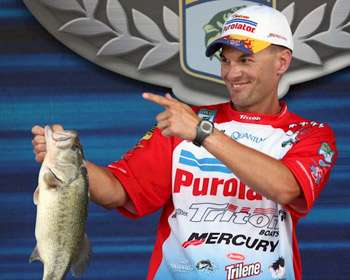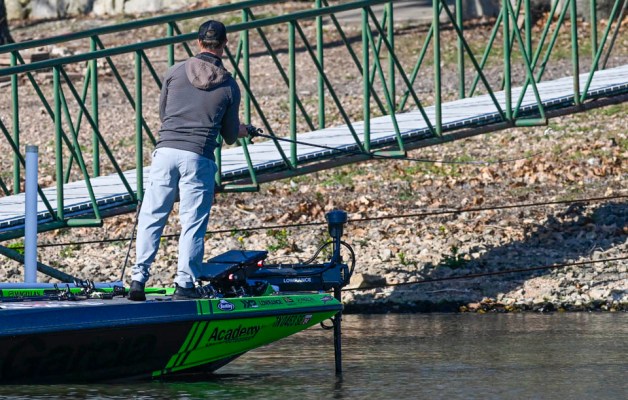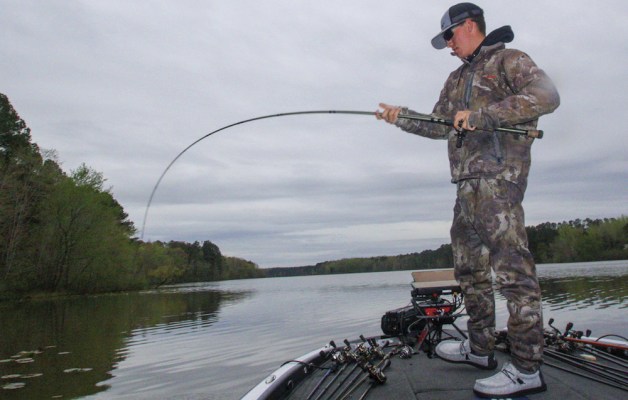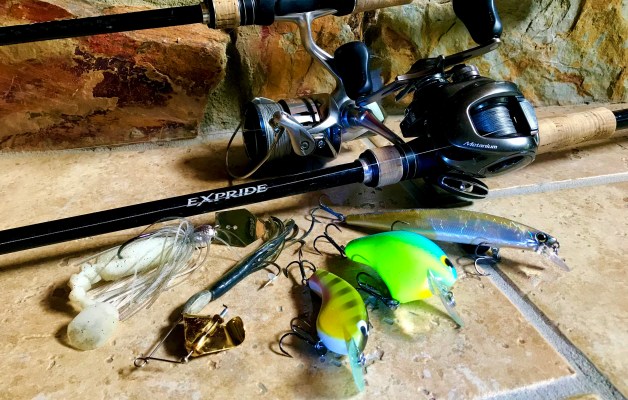
Many bass anglers have a strong affinity for topwater lures. There's something addictive about watching a bait that is gurgling, sashaying, and spitting across the water's surface disappear in an angry boil. The thrill of the strike may be enough to entice the weekend bass angler to throw a topwater lure even when conditions are no longer prime.
However, for the professional bass angler who pays his bills by catching bass, the topwater is just another tool in the tacklebox that has its time and place. So, when should you make the decision to put down the topwater? With a Top 10 finish in the Toyota Tundra Angler of the Year standings of the 2008 Elite Series, veteran pro Randy Howell knows how to make important on-the-water decisions when it comes to lure selection.
When deciding whether to keep a topwater in his hands or lay it on the deck, the Alabama pro keeps things simple. "I usually put the topwater bait down after about 30 minutes to an hour without getting a bite. At that point, I try to listen to my gut," explains Howell. "Especially if it's a bright high bluebird sky, it's time to pick up a different lure. The vast majority of the time, a topwater bite is simply an early morning deal. After that, you probably need to put it down, or you'll waste critical time where the fish are still biting something else." Howell is quick to note that there are exceptions to this rule.
Regardless of conditions, Howell will often throw a topwater to schooling bass during bluebird days. "There are times that that bright sun may actually bring up schooling bass that will hit a topwater," states Howell. Outside of schooling bass, he looks at several other factors. "The decision might depend on the water you are fishing, the region, the type of lake, and the cover," Howell explains. "Let's say you're fishing a lake like Guntersville, where you have grass everywhere and there is a combination of partly cloudy skies and some wind.
You might throw a big topwater bait like a Super Spook for an hour or two without a strike — and then you'll catch a 5- or 6-pound bass." Howell also keeps the topwater nearby when fishing river-run reservoirs. "On a river system, there's the opportunity to catch fish anytime of the day with topwater," he explains. "When the bass on a river system are roaming in shallow water, the topwater is never ruled out because it always offers the chance to catch a big fish."
When he's catching bass on a variety of offerings including topwaters, his lure selection is based on a simple comparison. "When the bass are hitting a number of lures, the decision on what to throw is something that we all struggle with," allows Howell. "Most of the time, I'll catch a few fish on topwater and then compare those fish to the ones that I catch flipping. Fairly often, the topwater fish will outweigh the bass I catch on other techniques."
The ability to score quality bass on top is an opportunistic approach that Howell uses to add important fish to the livewll. "If I feel like I can catch better quality fish on that topwater, I'll go ahead and risk it because most of the time I can go back to my other styles and catch them throughout the day. Often, you just can't do that with a topwater bite." Despite the tendency of bass to bite topwaters better early in the morning, Howell remains alert for others times during the day when surface action might occur.
"When bright bluebird skies come out, I'll put the topwater down and throw something else like a Fluke or Senko. But when the clouds roll back in, I'll pick up the topwater again. You really have to play it by ear, paying close attention to weather conditions and the type of water you are fishing." Howell admits that the allure of catching topwater bass has hurt him in the past. "There have been times that I've forced myself to fish topwater and it has burned me," he states.
"The decision to put the topwater down is so reliant on weather and water conditions. When conditions aren't right on a fishery that doesn't have a lot of cover or unique features, you might as well put your topwater stick away and move on to different techniques."
(Provided by Z3 Media)




